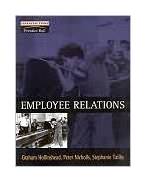Employee Relations
Brief
Description
This new text addresses
contemporary issues in the re-shaping of the employment relationship in Britain. It
reviews the position of traditional employee participants, management, trade unions and
government - and sets out the agenda for the year 2000 and beyond Attention is given to
non-unionism, differentiation in employment condition, values and ethics and the impact of
internationalisation on employee relations practice.
The text makes extensive use of Financial Times case material to illustrate the relevance
of the subject for the student. Other features include end of chapter exercises,
activities and questions.
The text is ideal for undergraduates or postgraduates. It will provide an up to date and
contemporary approach for those studying on Industrial Relations, HRM and IPD courses in
business schools. It will also be a valuable resource for departments of government/public
policy and social studies.
Features
- Perspectives
on the employment relationship.
- Emerging
management strategies and styles.
- Differing
emphasis in collectivism and individualism.
- The
European / international dimension.
- Employment
beyond the unionised workplace.
- Increasing
polarities within employment. Existence of high status, high pay, high security with their
opposite manifestations.
- Changing
patterns in Payment, Labour Flexibility and Equal Opportunities.
Contents
PART I INTRODUCTION
1. Introduction to employee relations
2. Context and theory in employee relations
PART II PARTIES
3. Management
4. Multinationals and employee relations
5. Trade Unions
6. The state in employee relations
PART III EUROPE AND THE CHANGING REGULATIONS
7. The European Union
8. Legal regulations of employment
PART IV PATTERNS AND PRACTICES
9. Collective Bargaining
10. Pay
11. Employee participation and involvement
12. Discrimination
13. Flexible labour markets, firms and workers
14. Public sector employment
15. Values and their impact on the changing employment relationship
Author Info
Graham Hollinshead, Peter
Nicholls, Stephanie Tailby
All at Bristol Business School, University of the West of England
With contributions from: John Black, formerly of Bristol Business School; Phil Cox,
Bristol Business School; Jane Evans, Bristol Business School; Sally Howe, Bristol Business
School; Mike Leat, Plymouth Business School; Mike Richardson, Bristol Business School;
Mike Salamon, University of Brunei Darussalam; Jackie Sinclair, Trinity College Dublin;
Richard Snape, University of West of England; Jill Woolley, Bristol Business School
576 pages


